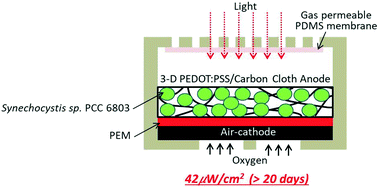Our official English website, www.x-mol.net, welcomes your
feedback! (Note: you will need to create a separate account there.)
Self-sustainable, high-power-density bio-solar cells for lab-on-a-chip applications
Lab on a Chip ( IF 6.1 ) Pub Date : 2017-10-02 00:00:00 , DOI: 10.1039/c7lc00941k Lin Liu 1, 2, 3, 4, 5 , Seokheun Choi 1, 2, 3, 4, 5
Lab on a Chip ( IF 6.1 ) Pub Date : 2017-10-02 00:00:00 , DOI: 10.1039/c7lc00941k Lin Liu 1, 2, 3, 4, 5 , Seokheun Choi 1, 2, 3, 4, 5
Affiliation

|
A microfluidic lab-on-a-chip system that generates its own power is essential for stand-alone, independent, self-sustainable point-of-care diagnostic devices to work in limited-resource and remote regions. Miniaturized biological solar cells (or micro-BSCs) can be the most suitable power source for those lab-on-a-chip applications because the technique resembles the earth's natural ecosystem – living organisms work in conjunction with non-living components of their environment to create a self-assembling and self-maintaining system. Micro-BSCs can continuously generate electricity from microbial photosynthetic and respiratory activities over day–night cycles, offering a clean and renewable power source with self-sustaining potential. However, the promise of this technology has not been translated into practical applications because of its relatively low power (∼nW cm−2) and current short lifetimes (∼a couple of hours). In this work, we enabled high-performance, self-sustaining, long-life micro-BSCs by using fundamental breakthroughs of device architectures and electrode materials. A 3-D biocompatible, conductive, and porous anode demonstrated great microbial biofilm formation and a high rate of bacterial extracellular electron transfer, which led to greater power generation. Furthermore, our micro-BSCs promoted gas exchange to the bacteria through a gas-permeable PDMS membrane in a well-controlled, tightly enclosed micro-chamber, substantially enhancing sustainability. Through photosynthetic reactions of the cyanobacteria Synechocystis sp. PCC 6803 without additional organic fuel, the 90 μL single-chambered bio-solar cell generated a maximum power density of 43.8 μW cm−2 and sustained consistent power production of ∼18.6 μW cm−2 during the day and ∼11.4 μW cm−2 at night for 20 days, which is the highest and longest reported success of any existing micro-scale bio-solar cells.
中文翻译:

可自我维持的高功率密度生物太阳能电池,用于芯片实验室应用
产生自身能量的微流控芯片实验室系统对于独立,独立,可自我维持的即时医疗点诊断设备在资源有限和偏远地区工作至关重要。微型生物太阳能电池(或微型BSC)可能是最适合芯片实验室应用的电源,因为该技术类似于地球的自然生态系统-生物与环境中的非生物成分协同工作,创建一个自我组装和自我维护的系统。微型BSC可以在昼夜循环中通过微生物的光合作用和呼吸活动不断发电,从而提供了具有自我维持潜力的清洁可再生电源。然而,-2)和当前的短寿命(约几个小时)。在这项工作中,我们通过使用设备架构和电极材料的根本突破,实现了高性能,自我维持,长寿命的微型BSC。3-D具有生物相容性,导电性和多孔性的阳极表现出了巨大的微生物生物膜形成和细菌细胞外电子转移的高速率,从而导致了更大的发电量。此外,我们的微型BSC通过在可控的紧密封闭的微腔室内通过可渗透的PDMS膜促进与细菌的气体交换,从而大大提高了可持续性。通过蓝藻光合反应蓝藻sp。PCC 6803没有附加有机燃料,产生的90μL单室生物太阳能电池的43.8厘米μW的最大功率密度-2和持续一致的功率生产~18.6μW厘米-2白天~11.4μW厘米-2在晚上进行了20天,这是现有微尺度生物太阳能电池中成功率最高和最长的报告。
更新日期:2017-11-07
中文翻译:

可自我维持的高功率密度生物太阳能电池,用于芯片实验室应用
产生自身能量的微流控芯片实验室系统对于独立,独立,可自我维持的即时医疗点诊断设备在资源有限和偏远地区工作至关重要。微型生物太阳能电池(或微型BSC)可能是最适合芯片实验室应用的电源,因为该技术类似于地球的自然生态系统-生物与环境中的非生物成分协同工作,创建一个自我组装和自我维护的系统。微型BSC可以在昼夜循环中通过微生物的光合作用和呼吸活动不断发电,从而提供了具有自我维持潜力的清洁可再生电源。然而,-2)和当前的短寿命(约几个小时)。在这项工作中,我们通过使用设备架构和电极材料的根本突破,实现了高性能,自我维持,长寿命的微型BSC。3-D具有生物相容性,导电性和多孔性的阳极表现出了巨大的微生物生物膜形成和细菌细胞外电子转移的高速率,从而导致了更大的发电量。此外,我们的微型BSC通过在可控的紧密封闭的微腔室内通过可渗透的PDMS膜促进与细菌的气体交换,从而大大提高了可持续性。通过蓝藻光合反应蓝藻sp。PCC 6803没有附加有机燃料,产生的90μL单室生物太阳能电池的43.8厘米μW的最大功率密度-2和持续一致的功率生产~18.6μW厘米-2白天~11.4μW厘米-2在晚上进行了20天,这是现有微尺度生物太阳能电池中成功率最高和最长的报告。











































 京公网安备 11010802027423号
京公网安备 11010802027423号